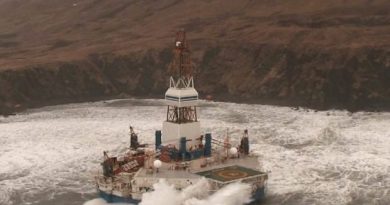Alaska investors nervous as oil price drop plays out
With the state of Alaska facing a budget deficit of $3.5 billion this year due in large part to lower oil prices and declining North Slope oil production, local investors are cautiously awaiting the consequences of the recent oil price drop.
On Monday, as a group of Wells Fargo wealth management employees and their clients gathered in Anchorage at the Embassy Suites hotel to focus on possible market trends of the upcoming year, comparisons were made to the economic crash of the mid-1980s — a particularly dark time for the Alaska economy. But most of the attendees felt the state is better situated to weather lean fiscal times today than it was 30 years ago.
Alaska North Slope crude closed last week under $50 per barrel — down significantly from the prices topping $100 per barrel seen over the last few years. And while oil and gas production and exploration account for as much as a third of the state’s economy, effects from the downturn have yet to be fully felt across the Last Frontier.
“There is a sense of nervousness about the economy, but nothing has happened yet,” said Neal Fried, economist for the Alaska Department of Labor.
And that sense of possible impending financial doom may actually help Alaska businesses, according to Wells Fargo’s Alaska Region President Joseph Everhart. Everhart said the economic collapse Alaska faced in the ’80s has helped businesses and investors prepare for the current financial situation.
In 1986, oil prices dropped to $12 per barrel. Coupled with high interest rates, thousands of people left the state in one of the biggest out-migrations in Alaska history. The housing market crashed, and businesses shuttered.
“The nice thing is every company in Alaska has this hangover from the 1980s, and really realizes the importance of paying attention and building sound business plans,” Everhart said.
Everhart said Alaska businesses and the state government generally have larger pools of cash with which to ride out the current drop in oil prices.
Still, investors are nervous, even though they may have different worries than they did in the ’80s. The U.S. economy is currently in a “low everything” economic phase, according to Wells Fargo’s managers. Near historically low interest rates, coupled with a strong stock market, low inflation and low unemployment — and in Anchorage, a low availability of housing — come with concerns that the future economy could stagnate. It is not a scenario most investors are familiar with.
“Now we worry about not enough inflation,” said Wells Fargo Wealth Management Group Chief Investment Officer Eric Davidson. “It’s like being worried about not enough body fat.”
“We have a pent up demand for housing in Anchorage,” McLean said. “The current housing vacancy rates are the lowest they have been in the last 10 years.”
Still, when it comes to how the state may fare under current oil prices and the continued decline in production, all eyes remain on the Alaska Legislature.
“The Legislature needs to make some pretty tough decisions, and cutting $300-$400 million (from the state’s budget) is not enough,” Everhart said. Everhart does not believe the economic “sky is falling,” but he does think lower oil prices will stick around for some time, citing a remark made in January by the chairman of Saudi Arabia’s oil holdings.
“If a Saudi prince tells you it is never going to be over $100 a barrel again, I think you have to take that pretty seriously,” he said.



